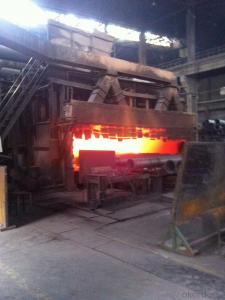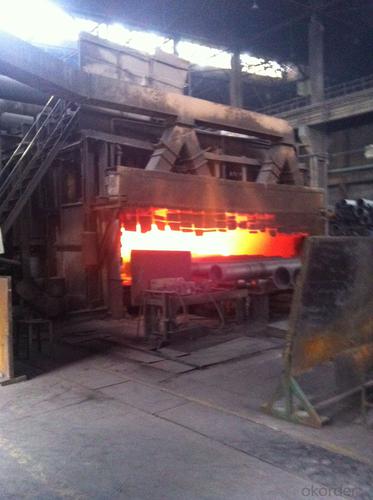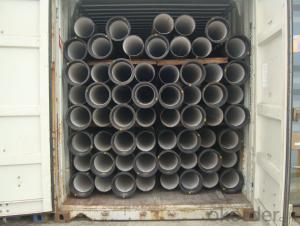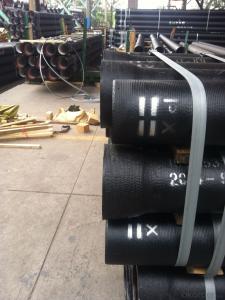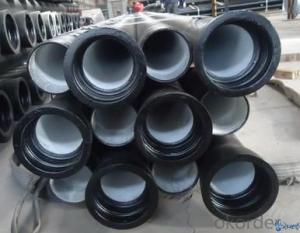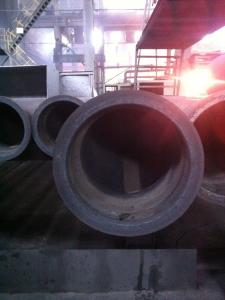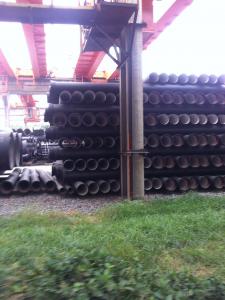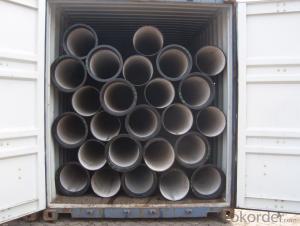DUCTILE IRON PIPE AND PIPE FITTINGS K8 CLASS DN1000
- Loading Port:
- Tianjin
- Payment Terms:
- TT OR LC
- Min Order Qty:
- 23 pc
- Supply Capability:
- 3000 pc/month
OKorder Service Pledge
OKorder Financial Service
You Might Also Like
· Material : Ductile Cast Iron
· Size Range : DN 80mm to DN 2000mm
· Unit Effective Length : 6m or 5.7m
· Manufacture Standard: ISO 2531:1998/ EN 545:2006/EN 598:2007
· Annual capacity : 200,000 tons
· Coating Exterior: Zinc 130g/m2 according to ISO 8179-1 and bitumen coating 70 microns.
· Cement Interior: Portland Cement/ High Alumina Cement/ Sulphate Resisting Cement Lining according to ISO 4179
· Special requirements on external coating and internal lining can be applied
· We also provide accessories such as SBR/EPDM rubber gaskets, lubricant paste, pipe caps, PE sleeves, etc.
Additional Parts:
Each pipe is strictly inspected according to related standard to ensure permanently high performance.
Easy Installation at site and service free for life
Long Service Lifespan
Quotation will arrive you within 24hours once we get your inquiry.
We guarantee offering you a competitive price.
A copy of original inspection reports of pipes will be offered after shipment.
Photos of loading process will be sent to the customer after shipment effect.
We will follow-up the delivery progress after shipment effect and update to the customer on weekly basis.
- Q: How does ductile iron pipe perform in seismic conditions?
- Ductile iron pipe is known for its excellent performance in seismic conditions. It has proven to be a reliable and durable choice for underground water and wastewater systems, especially in areas prone to earthquakes. The inherent strength and flexibility of ductile iron pipe make it highly resistant to seismic forces. It can withstand ground movements and vibrations caused by earthquakes without significant damage or failure. This is due to its unique composition, which includes a high percentage of iron combined with small amounts of carbon and other alloying elements. The ductile iron pipe's ability to absorb and dissipate seismic energy through its inherent flexibility is crucial in seismic conditions. When the ground shifts during an earthquake, the pipe can adjust and deform slightly to accommodate the movement, thus minimizing stress concentrations and the risk of fractures. Moreover, ductile iron pipe has excellent joint integrity, which is vital in seismic conditions. The joints are designed to provide maximum strength and resistance against external forces, including seismic activity. Various joint types, such as push-on, mechanical, and restrained joints, are available to suit different seismic requirements and installation conditions. In addition to its mechanical properties, ductile iron pipe also offers long-term corrosion resistance. It is typically lined with a cement mortar or a protective coating, which acts as a barrier against corrosive elements in the soil or water. This corrosion resistance ensures the pipe's structural integrity and longevity, even in areas with high seismic activity. Overall, ductile iron pipe has a proven track record of performing exceptionally well in seismic conditions. Its strength, flexibility, joint integrity, and corrosion resistance make it a reliable choice for underground infrastructure, providing safe and efficient water and wastewater systems in earthquake-prone regions.
- Q: How are ductile iron pipes protected against interior corrosion?
- Ductile iron pipes are protected against interior corrosion through a process called cement-mortar lining. This involves applying a thick layer of cement mortar to the interior surface of the pipes, which acts as a protective barrier against corrosion caused by the flow of water or other substances. Additionally, corrosion-resistant coatings can also be applied to the pipes to provide further protection.
- Q: Can ductile iron pipe be used in areas with high groundwater levels?
- Yes, ductile iron pipe can be used in areas with high groundwater levels. Ductile iron is known for its durability and corrosion resistance, making it suitable for underground applications including areas with high groundwater levels.
- Q: What is the wall thickness of K10 grade dn=400 ductile iron pipe?
- Ductile iron pipe, class K10, DN400 theoretical weight table:Grade K10, DN400 ductile iron pipe wall thickness (T):9mm.Nominal diameter (DN) 400mm, its outer diameter (DE) 429mm.The approximate weight (kg) 29.5. of the crown of the socket;Straight part weight per meter (kg) 83.7.Total quality (kg) (length standard 6000mm) 532.Total mass (kg) (standard work length 5000mm) 448.The main characteristics of ductile iron pipes: ductile iron pipe is a kind of cast iron pipe. Having the nature of iron; the properties of steel. Ductile cast iron pipe after annealing, the microstructure is ferrite and pearlite, good mechanical properties, excellent corrosion resistance, good ductility, good sealing effect, simple installation, mainly for municipal, industrial and mining enterprises, water supply, gas, oil etc..
- Q: What is the excavation width of ductile iron pipes with diameters greater than 1400?
- Because of differences in depth and soil properties, the excavation width is differentUsually to ensure that the width of bottom surface on both sides of the 600 1400+ manual operation. (such a large pipe flange bolt, the tool is not easy to expand, so the need for manual operation. So wide)
- Q: Can ductile iron pipes be used in sewage treatment plants?
- Yes, ductile iron pipes can be used in sewage treatment plants. Ductile iron is commonly used in sewage systems due to its durability, corrosion resistance, and ability to withstand high pressure and load-bearing requirements. It is an ideal material choice for transporting sewage and wastewater within treatment plants.
- Q: Can ductile iron pipes be used for underground utilities?
- Underground utilities can indeed utilize ductile iron pipes. Renowned for their robustness, strength, and ability to withstand external pressure, ductile iron pipes prove to be a fitting option for subterranean applications demanding remarkable load-bearing capacity, such as utility installations. Furthermore, these pipes exhibit resistance to corrosion, a crucial attribute for underground environments that subject the pipes to dampness and soil conditions. Moreover, ductile iron pipes surpass alternative materials in terms of service life, thereby reducing the necessity for frequent replacements and maintenance. Consequently, ductile iron pipes find widespread application in underground utilities, encompassing water distribution, sewage systems, and gas pipelines.
- Q: What is the expected corrosion protection system for ductile iron pipes?
- Typically, the expected corrosion protection system for ductile iron pipes involves a combination of external coatings, internal linings, and cathodic protection. To protect against corrosion, external coatings are applied to the pipe's exterior surface. These coatings, usually fusion-bonded epoxy, polyethylene, or polyurethane, act as a barrier against corrosion from soil, water, and chemicals. Furthermore, they play a crucial role in prolonging the pipe's lifespan. In order to safeguard against corrosion caused by the transported fluid, internal linings are applied to the pipe's interior surface. These linings, which can be made of cement mortar, epoxy, or polyurethane, provide a smooth and protective layer that prevents the formation of rust and scale. Cathodic protection is an electrochemical technique employed to shield ductile iron pipes from corrosion. It involves the utilization of sacrificial anodes or impressed current systems to generate a protective electrical current that counteracts the corrosion process. By employing this method, the formation of rust is prevented, thereby extending the pipe's longevity. It is important to acknowledge that the specific corrosion protection system for ductile iron pipes may differ depending on the application and environmental factors. To determine the appropriate corrosion protection system for a specific ductile iron pipe installation, consulting with corrosion experts and adhering to industry standards and guidelines is of utmost importance.
- Q: Can ductile iron pipe be used for municipal water supply?
- Indeed, municipal water supply systems have extensively relied on ductile iron pipe for numerous years, owing to its exceptional durability, strength, and corrosion resistance. Its suitability for underground use is evident in its ability to endure high pressure and substantial loads. Moreover, ductile iron pipe boasts an extended lifespan, often surpassing 100 years, making it a fiscally prudent option for municipal water supply systems. In summary, ductile iron pipe serves as a dependable and prevalent material for guaranteeing the secure and effective transportation of water to communities.
- Q: How are ductile iron pipes protected from external damage?
- Ductile iron pipes are protected from external damage through the application of protective coatings. These coatings act as a barrier, shielding the pipes from corrosion and other forms of external damage. Additionally, the pipes may be encased in concrete or installed in a casing pipe to provide further protection against external forces and impacts.
Send your message to us
DUCTILE IRON PIPE AND PIPE FITTINGS K8 CLASS DN1000
- Loading Port:
- Tianjin
- Payment Terms:
- TT OR LC
- Min Order Qty:
- 23 pc
- Supply Capability:
- 3000 pc/month
OKorder Service Pledge
OKorder Financial Service
Similar products
Hot products
Hot Searches
Related keywords
